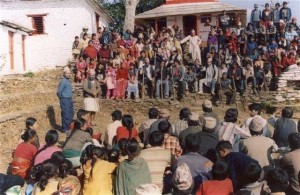Caste based discrimination still prevalent in India
 Caste-based discrimination maybe abolished by law in India but it remains a major cause why backward classes, especially the Dalits, remain confined to menial tasks like manual scavenging and removal of dead animals, a latest report by the International Labour Organisation (ILO) on discrimination in the job sector has said.
Caste-based discrimination maybe abolished by law in India but it remains a major cause why backward classes, especially the Dalits, remain confined to menial tasks like manual scavenging and removal of dead animals, a latest report by the International Labour Organisation (ILO) on discrimination in the job sector has said.
Affirmative action has been able to assist only a small number of Dalits in finding formal jobs but has failed to provide even and equal opportunities to all, the report added.
“Violence, discrimination and segregation are a daily experience for millions of men and women in several regions of the world. But the practice (of discrimination that is rooted in caste or similar systems) is most widespread in South Asia, particularly in India and Nepal,” the report, titled ‘Equality at Work: Tackling the Challenges’ remarked.
The report, a follow-up to the ILO Declaration on Fundamental Principles and Rights at Work, was released in New Delhi by the Union Labour and Employment Minister, Oscar Fernandes, on Thursday.
The report added that Dalits are generally not accepted for any work involving contact for water and food for non-Dalits or entering a non-Dalit residence. “Thus, they are excluded from a wide-range of work opportunities in the area of production, processing or sale of food items, domestic work and the provision of certain services in the private and public sectors,” the report said, adding their situation is further impaired by limited access to education, training and resources.
The report advised authorities not to merely adopt a “purely development approach to improve the lot of Dalits”. It suggested that underlying structural causes and caste barriers need to be addressed simultaneously.
The ILO is also looking closely at the National Rural Employment Guarantee Programme (NREGP). “It is premature to draw any conclusions about the impact of the scheme on poverty and gender equality, but concerns have been voiced about possible tensions within families over the selection of the member to be given the job and about women being left out,” it said.
The ILO is conducting surveys in select districts to examine the decent work and gender equality aspects of NREGP. “The ultimate goal is to devise the necessary safeguards to be put in place in the NREGP so that men and women can benefit from it equally,” the report said.
New Delhi, May 10, 2007
Hindustan Times
11 May 2007





